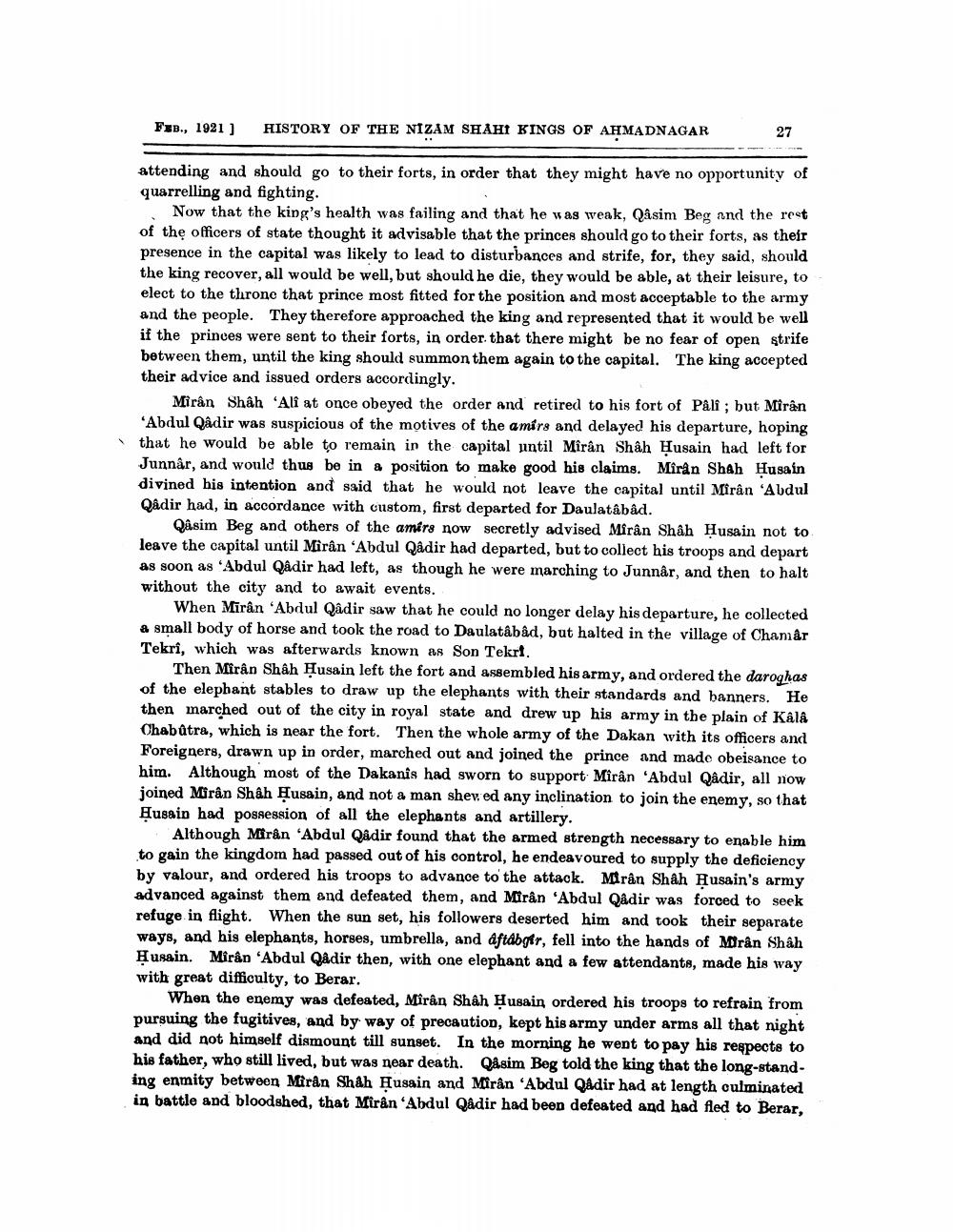________________
Feb., 1921]
HISTORY OF THE NIZAM SHAHI KINGS OF AHMADNAGAR
27
attending and should go to their forts, in order that they might have no opportunity of quarrelling and fighting.
Now that the king's health was failing and that he was weak, Qasim Beg nnd the rest of the officers of state thought it advisable that the princes should go to their forts, as their presence in the capital was likely to lead to disturbances and strife, for, they said, should the king recover, all would be well, but should he die, they would be able, at their leisure, to elect to the throne that prince most fitted for the position and most acceptable to the army and the people. They therefore approached the king and represented that it would be well if the princes were sent to their forts, in order that there might be no fear of open strife between them, until the king should summon them again to the capital. The king accepted their advice and issued orders accordingly.
Mirân Shâh 'Ali at once obeyed the order and retired to his fort of Pålî ; but Mirân 'Abdul Qadir was suspicious of the motives of the amire and delayed his departure, hoping that he would be able to remain in the capital until Miran Shah Husain had left for Junnar, and would thus be in a position to make good his claims. Miran Shah Husain divined his intention and said that he would not leave the capital until Mirân 'Abdul Qâdir had, in accordance with custom, first departed for Daulatâbâd.
Qasim Beg and others of the amire now secretly advised Miran Shah Husain not to leave the capital until Miran 'Abdul Qadir had departed, but to collect his troops and depart as soon as 'Abdul Qadir had left, as though he were marching to Junnar, and then to halt without the city and to await events.
When Miran Abdul Qadir saw that he could no longer delay his departure, he collected a small body of horse and took the road to Daulatâbâd, but halted in the village of Chamar Tekri, which was afterwards known as Son Tekri.
Then Mirân Shâh Husain left the fort and assembled his army, and ordered the daroghas of the elephant stables to draw up the elephants with their standards and banners. He then marched out of the city in royal state and drew up his army in the plain of Kala Chabâtra, which is near the fort. Then the whole army of the Dakan with its officers and Foreigners, drawn up in order, marched out and joined the prince and made obeisance to him. Although most of the Dakanis had sworn to support Miran 'Abdul Qadir, all now joined Miran Shah Husain, and not a man shev ed any inclination to join the enemy, so that Husain had possession of all the elephants and artillery.
Although Mirån 'Abdul Qadir found that the armed strength necessary to enable him to gain the kingdom had passed out of his control, he endeavoured to supply the deficiency by valour, and ordered his troops to advance to the attack. Miran Shah Husain's army advanced against them and defeated them, and Miran 'Abdul Qadir was forced to seek refuge in flight. When the sun set, his followers deserted him and took their separate ways, and his elephants, horses, umbrella, and aftabgtr, fell into the hands of Mrân Shah Husain. Miran Abdul Qadir then, with one elephant and a few attendants, made his way with great difficulty, to Berar.
When the enemy was defeated, Miran Shah Husain ordered his troops to refrain from pursuing the fugitives, and by way of precaution, kept his army under arms all that night and did not himself dismount till sunset. In the morning he went to pay his respects to his father, who still lived, but was near death. Qasim Bog told the king that the long-standing enmity between Miran Shah Husain and Miran 'Abdul Qadir had at length culminated in battle and bloodshed, that Mirân ‘Abdul Qadir had been defeated and had fled to Berar,




